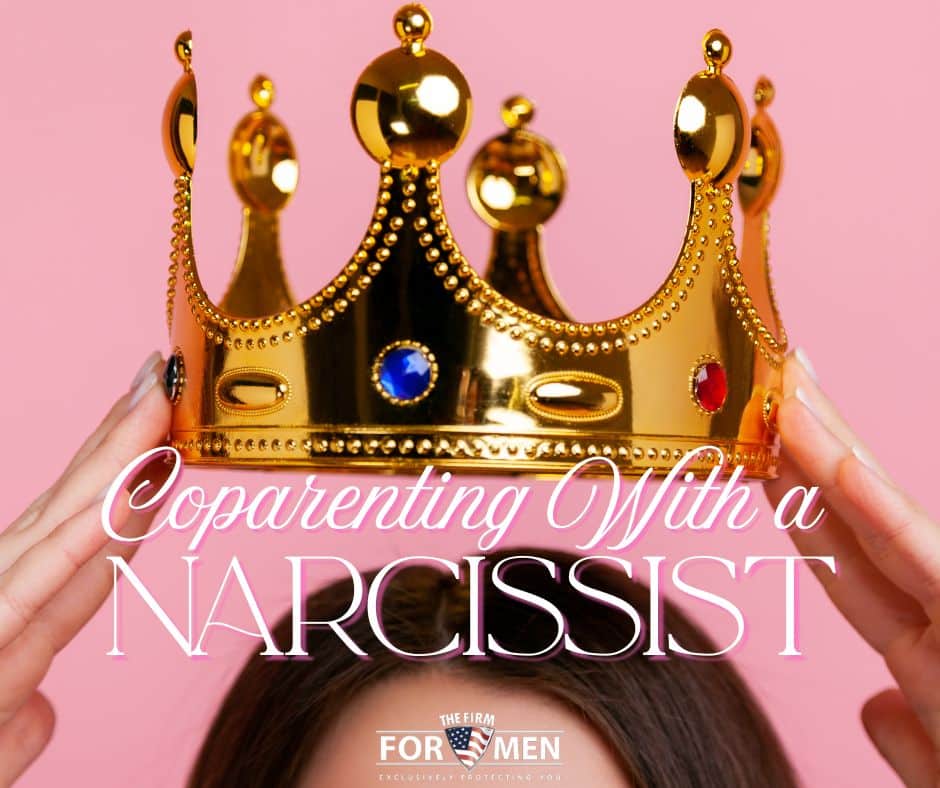Most of the law lives in Latin, a dead language. The word “narcissism,” though, comes from the Greek word narkissos, which comes from narkē, meaning numbness. That is an apt origin for a trait that makes narcissists and their victims numb to most of the joys of life. Perhaps you married a narcissist, divorced, and now have to coparent with the same numbing personality. After your Virginia divorce or breakup, try these helpful hints for dealing with the narcissist in your life.
Jump to a Section
- Understanding Narcissism in Divorce and Coparenting
- Why Diagnosing Your Ex Isn’t the Goal
- Coparenting Challenges After a Virginia Divorce
- When Coparenting Becomes Parallel Parenting
- Coparenting Mistakes to Avoid with a Narcissistic Ex
- Why Legal Experience Matters in Custody and Coparenting Cases
- Protecting Children’s Best Interests with a Virginia Family Law Attorney
Understanding Narcissism in Divorce and Coparenting
Clinical Definitions of Narcissistic Personality Disorder
For any Virginia man suffering under the spell of a narcissist, a definition of narcissism may be unneeded. But what if you think your spouse has some issue but you cannot put your finger on the problem?
This is what narcissism is — or, more accurately — what Narcissistic Personality Disorder (NPD) is, according to:
- The Mayo Clinic — A mental health condition in which people have an unreasonably high sense of their own importance
- The American Psychiatric Association — a pervasive pattern of grandiosity (sense of superiority in fantasy or behavior), need for admiration, and lack of empathy, beginning by early adulthood and occurring in a variety of contexts
- The National Library of Medicine — a complex psychological condition that presents with a pervasive pattern of grandiosity, need for admiration, and lack of empathy [and which can cause] significant social and occupational impairment and often has complications of co-morbid psychiatric and substance use disorder
Don’t confuse narcissism with the lovely narcissus, or daffodil. Narcissus plants have poisonous bulbs, leaves, and flowers. Narcissists, similarly, can be toxic to relationships.
Nine Signs Your Ex May Be a Narcissist
Narcissists really do believe in equality — they are equally bossy to everyone.
Duke Health offers the acronym SPECIAL ME to identify nine signs of NPD:
- Sense of self-importance
- Preoccupation with power, beauty, or success
- Entitled
- Can only be around people who are important or special
- Interpersonally exploitative for their own gain
- Arrogant
- Lack empathy
- Must be admired
- Envious of others or believe others are envious of them
If these traits sound familiar, your ex-spouse may be a narcissist.
Why Diagnosing Your Ex Isn’t the Goal
Diagnosing and treating narcissism in your ex-spouse is not your problem. You have to deal with the symptoms, but your ex is not your project to fix.
A combination of therapy and medication may help your ex, but your focus should be on coparenting in Virginia — not curing your former spouse. Confronting your ex about NPD can lead to futility and wasted energy.
Coparenting Challenges After a Virginia Divorce
Practical Strategies for Coparenting with a Narcissist
Coparenting assumes two rational adults share responsibility. But narcissists thrive on conflict. You should:
-
Accept their behavior
-
Set clear boundaries
-
Make a detailed parenting plan in writing
-
Limit communication (use email, not text)
-
Stay calm during conflict
-
Keep perspective when attacked
Setting Boundaries and Creating a Parenting Plan
A strong parenting plan outlines drop-offs, pick-ups, after-school activities, and holidays. Written agreements protect against manipulation and gaslighting.
Communication Tips with a Narcissistic Coparent
Keep communication short, businesslike, and in writing. Avoid emotional responses or over-explaining. This protects you and creates a record.
When Coparenting Becomes Parallel Parenting
According to Psychology Today, true coparenting with a narcissist may be impossible. Instead, you may need parallel parenting — keeping contact minimal while focusing separately on strong, healthy parent-child relationships.
This means detailed schedules, separate attendance at events, and removing emotion from interactions. Though not ideal, parallel parenting can reduce conflict and protect children.
Coparenting Mistakes to Avoid with a Narcissistic Ex
If you are determined to coparent with a narcissist, avoid these pitfalls:
- Don’t argue — it fuels conflict
- Don’t over-explain — keep it brief and neutral
- Don’t let fear control you — stay calm and composed
- Don’t try to control everything — focus only on your child’s well-being
- Don’t use your child in conflict — the child’s health and safety come first
Why Legal Experience Matters in Custody and Coparenting Cases
If you know your ex-spouse is a narcissist and you need to work through child custody, child support, parenting time, or spousal support, you need an experienced Virginia family law attorney.
A knowledgeable attorney will prioritize the best interests of the child while crafting strict custody schedules, detailed settlement agreements, and enforceable parenting plans that minimize your ex’s opportunities to manipulate.
Protecting Children’s Best Interests with a Virginia Family Law Attorney
Your family law attorney can prepare airtight agreements to close loopholes a narcissistic ex might exploit. At The Firm For Men, we know narcissists — and we know Virginia courts.
We will handle negotiations, documentation, and court representation to protect you and your children. Contact us today at (757) 383-9184 to schedule a consultation.

